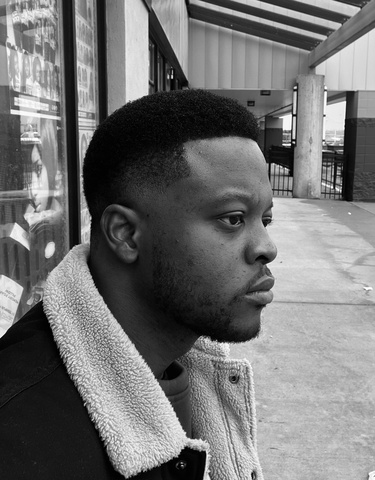The Writing University conducts a series of interviews with writers while they are in Iowa City participating in the various University of Iowa writing programs. We sit down with authors to ask about their work, their process and their descriptions of home.

Today we are speaking with Reyumeh Ejue, a Nigerian writer, currently an MFA candidate at the Iowa Writers' Workshop.
1. Can you tell us a little bit about what brought you to the University of Iowa?
The Iowa Writers' Workshop. It's as simple as that. I knew about the workshop before I knew what an MFA was. I had heard that this was the place if you wanted to learn a thing or two about writing. So when I felt like I needed to learn a thing or two about writing, I decided to come here.
2. What is the inspiration for your work right now?
Right now there are three subjects I can't get off my mind. The first is memory, which is probably because I'm far from home and all I have are memories of family, friends and all the human moments we have shared. Another thing that continues to fascinate me is the complex nature of human beings and how nuanced our interactions with each other, ourselves, and our wider environs can be. I do not presume to judge, only to understand people. Finally, an ever continuing influence of mine is the family, the primary social unit of our lives. I don't believe there is any such thing as a functional family, only dysfunctional ones, and I'm obsessed with exploring the distinct forms of this dysfunction.
3. Do you have a daily writing routine?
Yes I do. I used to write for an hour every morning, every day of the week except the weekend. But I started teaching recently, on Monday mornings, so I have had to adjust my schedule. Now I write on Saturdays, but not Sundays or Mondays. I'm also a little reticent to say I write for an additional forty-five minutes every evening. Reticent because this is a new development, but as I've kept at it for close to a year, I suppose it must be part of my writing routine now.
4. What are you reading right now? Are you reading for research or pleasure?
I'm always reading for enlightenment. Sometimes I don't access the blessings of what I read until years later. But eventually it all becomes useful, even if in intangible ways. I am currently reading The Last Temptation of Christ by Nikos Kazantzakis. Beyond the great scandal of the subject matter, which is the demystification of the most important story in the Christian religion, lies some of the best prose I've read. Lyrical and packed with what feels like important cultural detail of the period, the book sings in places, like when Jesus goes to propose to Magdalene for the first time and she descends "upon him with her red sandals, unplaited hair and complete armor of ankle bands." I am also reading, The Roving Shadows by Pascal Quignard, which because he's French, is fleet footed (or should it be fleet handed) in enlisting an expansive vocabulary to interrogate the self. And finally, The Remainder by Alia Trabucco Zerán. Chilean writers, I believe, are some of the best in the world, other than Nigerian writers of course. And the inventiveness and economy of this book left me envious.
5. Tell us about where you are from - what are some favorite details you would like to share about your home?
I am from Ikom and Idum-Mbube, both of them towns in Cross River State, Nigeria. I grew up in one, and I am intrinsically connected to the other (don't ask which is which). The soil runs through my blood. Ikom is located in the middle part of the State, and has an enormous hill called Ekabokom that can be seen from almost every part of the town. Idum-Mbube is more northerly and gets very cold during the harmattan season. The first act of the Nigerian civil war was committed in the surrounding area of the town, when tanks belonging to the Nigerian Army rolled across the Biafran border into Ogoja.
***
Thank you so much for talking with us today, Reyumeh!